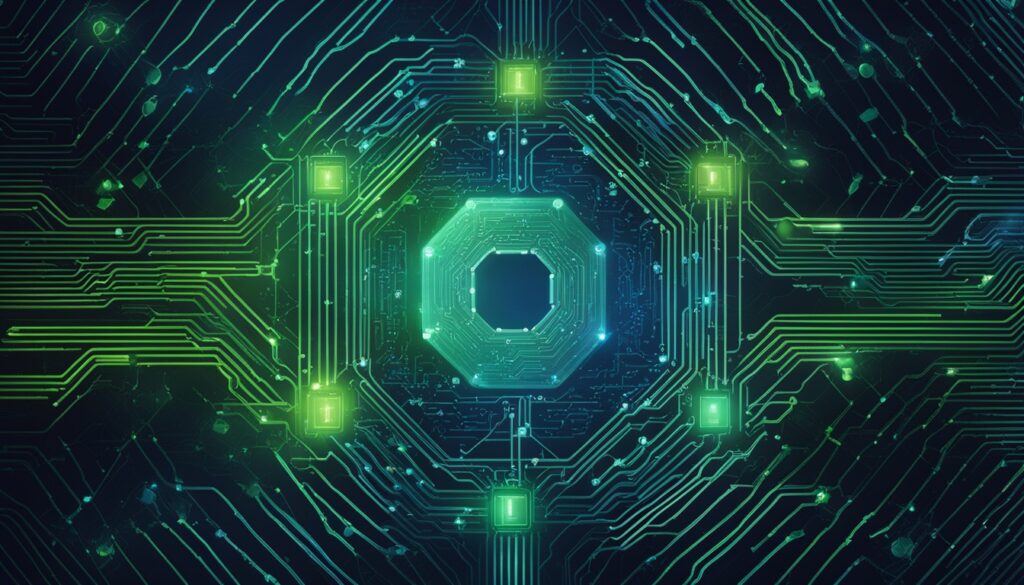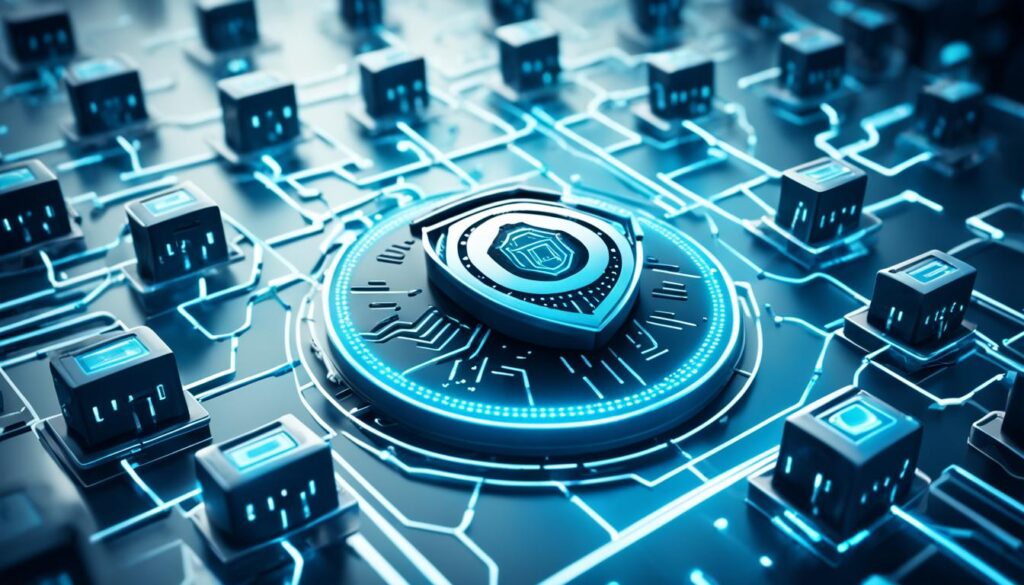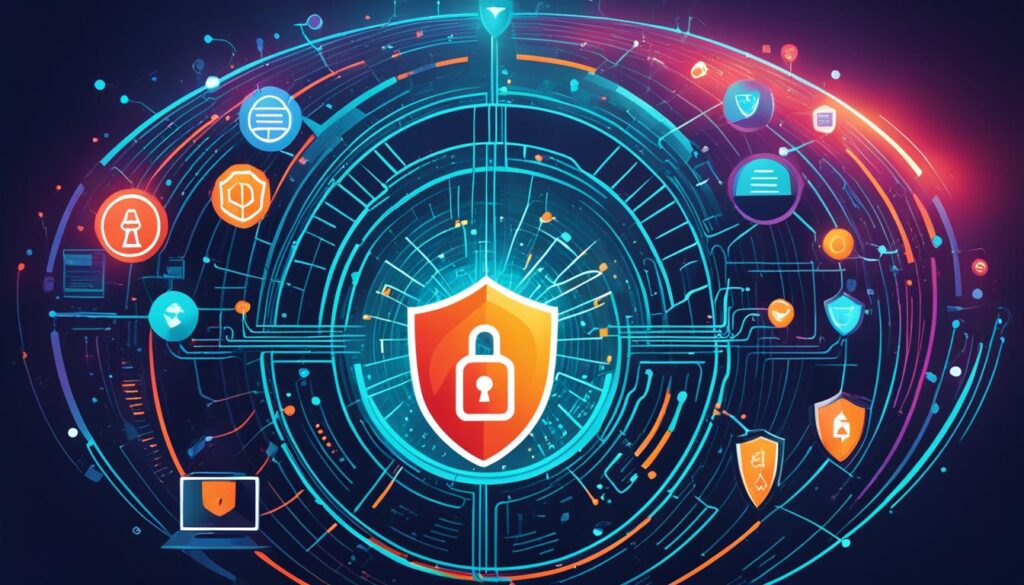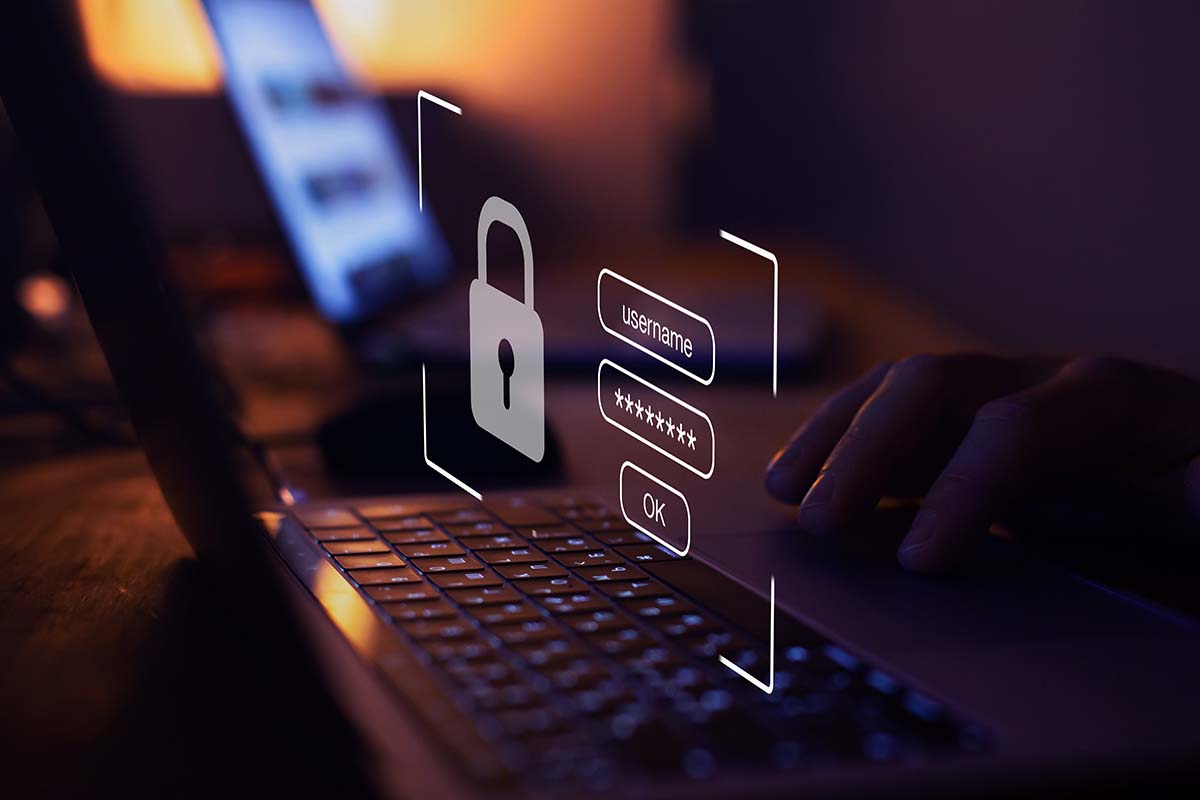How is AI Used in Cyber Security? Explore the Benefits
Artificial intelligence (AI) is now being used in our daily lives, from customer service to fighting cybercrime. It’s still new, but AI in cybersecurity is making waves, helping both security experts and cyber attackers. Leading the way is Ark Solvers, a top cybersecurity firm that uses AI to spot threats, analyze malware, check networks, and automate security measures with smart algorithms. Their AI-based tools are arming businesses against cyber threats, which are on track to cost the world $8 trillion by 2023 and up to $10.5 trillion by 2025.
An abstract representation of AI and cybersecurity merging, with AI algorithms and security protocols forming a unified network. Show the colors blue, green, and silver, symbolizing technology and security. The image should convey the idea that AI is a powerful tool for protecting against cyber threats such as malware, viruses, and hacking attempts. Consider including elements like glowing lines, circuits, or data streams to suggest the advanced tech nature of AI cybersecurity.

Key Takeaways
- AI can analyze massive amounts of data for cybersecurity patterns, enhancing threat detection and response in real-time.
- AI detects anomalies and vulnerabilities, reducing the occurrence of human error and automating repetitive tasks to free up employees’ time.
- AI in cybersecurity improves team efficiency and productivity, offering insights based on large security data volumes in a fraction of the time compared to traditional processes.
- AI brings advantages in detecting and responding to evolving cyber threats such as polymorphic malware and “living-off-the-land” attacks faster than manual analysis alone.
- AI offers quick analysis of large data sets, automates repetitive processes, detects anomalies, and safeguards sensitive data, enhancing threat detection and response.
Understanding AI and Its Role in Cybersecurity
The mention of “artificial intelligence” might bring to mind wild images of self-thinking robots. However, AI is far simpler in its day-to-day use. In simple words, artificial intelligence merges computer science with vast sets of data. This fusion aims to automate how we solve problems and make decisions. Because AI can process things faster and hold a lot of memory, we’re seeing a revolution in how it’s used today.
Read More: What is Cybersecurity? Types, Threats, and Cyber Safety Tips
What is Artificial Intelligence?
AI is a part of computer science striving to make smart machines. These machines can tackle tasks that we usually think only humans can do. In the realm of cybersecurity, AI’s algorithms are very useful. They sort through huge amounts of data. This helps detect patterns that signal cyber threats and check networks for weak points.
Machine Learning and Deep Learning
Under the AI umbrella, machine learning is a key player. It teaches machines to act smart like humans but without direct programming. Another important area in AI, deep learning, uses neural networks. These networks copy how our brain learns. Both these AI methods are changing the game in cybersecurity. They’re offering better ways to spot and deal with threats.

Current Applications of AI in Cybersecurity
AI’s use in cybersecurity is quickly picking up pace. Many groups are now making it a central part of their safety plans. AI shines when it comes to spotting threats more cleverly and accurately. It’s great to look at how people and networks act and find odd patterns. Also, AI helps cut down on false alarms in security warnings, which old cybersecurity methods often struggle with.
In the past, cybersecurity mainly depended on tools that checked for known threats by their signatures. While these were good against what we already knew, they weren’t ready for brand-new threats. Now, AI in cybersecurity can look at large data pools very quickly. This ability is a big plus, helping to find strange activities, boost how efficient our teams are, and get more work done. Knowing about things like machine learning and deep neural networks is key for anyone wanting to use AI in cybersecurity.
AI might sound perfect, but it also comes with its own set of problems, like getting false alarms due to old data. Plus, there’s the danger of bad actors using AI for harm. Still, AI is changing how we defend systems and data, making our reaction to threats faster and better.
Read More: Different Types of Cyber Security: A Comprehensive Guide
How is AI Used in Cyber Security?
Artificial intelligence (AI) is a major player in the war on cybercrime. It changes how we deal with threats, analyze malware, and watch networks. AI and machine learning (ML) boost the performance of security operations centers (SOCs), making them more resilient.
Read More: Can AI Replace Cybersecurity?
Monitoring and Analyzing Behavior Patterns
AI tools constantly monitor network traffic and user actions. They use smart analysis to spot anything unusual that might signal a breach. This real-time analysis and automated security tasks give teams the information they need to outsmart cyber threats.
Predicting Outcomes of Unusual Behavior
By looking at historical data and finding trends, AI can predict what might happen with odd network or user actions. This prediction power lets security teams act before a cyber attack, making overall defenses stronger.

Preventing Bad Actions and Outcomes
AI quickly sorts through a lot of data to find threats and weaknesses before cybercriminals can strike. It also speeds up the average response time of teams to alerts by 55% and cuts fraud costs by up to 90%.
Training and Machine Learning
AI and ML get better by studying big sets of known threats. This way, they can deal with any new, unseen attacks. ML makes it possible for machines to become smarter on their own. This improves AI’s skills in hunting threats and running SOC tasks. Using deep learning and neural networks, AI can think like a human brain but process data much faster.
Companies that use AI and automation for security have cut their data breach costs by about USD 3 million, on average. Yet, applying AI in cybersecurity does come with some dangers, like false alarms on new threats and hacker misuse. To use AI effectively in security, you need a mix of data science, ML, and cybersecurity know-how. This includes expertise in network security, spotting malware, and keeping data safe.
Create an image that shows AI as a shield protecting a network from cyber threats. Use vibrant colors and sharp lines to depict the effectiveness and efficiency of AI in identifying and neutralizing potential attacks. Have the shield surrounded by a network of interconnected devices and systems, highlighting the far-reaching impact of cyber security. Show the shield as the first line of defense, with other security measures layered behind it for added protection.
Advantages of AI in Cybersecurity
The use of AI to protect against cyber threats has many advantages. AI tools from Ark Solvers offer significant benefits:
High Data Capacity and Processing Power
AI-driven solutions can spot harmful actions through various data connections. This allows for early systematic defense at a low cost. Compared to old methods, AI security is more precise and efficient. It spots hidden dangers by understanding complex patterns better. AI’s automation sorts huge data volumes quickly and with high accuracy. It adapts easily, getting rid of delays in handling security issues and cutting down on costs.
Improved Threat Detection and Response
AI tools watch over networks continuously, which takes a lot of work to do manually. This lowers the number of false alarms, making security teams more effective. By studying past and present data, AI can even predict upcoming threats. In the face of big cyber attacks, usual defenses might fall short. AI can swiftly process huge data loads, reacting at lightning speeds, proving invaluable.
Reduced Human Error and Automation
AI’s machine learning gets better with time by learning new patterns. This means more accurate risk assessments as it goes along. AI also helps in finding and fixing system weak spots, safeguarding against future problems. It can even adjust who has access to sensitive data based on usage and other cues. This lowers the chance of data leaks from stolen logins.
Accelerated Troubleshooting and Incident Response
AI catches malicious acts early by seeing links in various data. This means defending systems sooner and without a huge expense for extra gear or workers. It speeds up analyzing, fits any size job, and brings the cost of defense down.
Read More: Why AI is the Future of Cybersecurity?
Challenges and Limitations of AI in Cybersecurity
AI is great for keeping our data safe, but it could be better. For example, it may not always make the best judgment calls like a human. Though AI can catch threats quickly, it might miss the bigger picture or fail to make smart decisions, which could lead to problems that humans would avoid.
Lacking Human Judgment and Potential Biases
AI systems sometimes warn us about harmless actions, thinking they’re dangerous. This mistake might disrupt our work and waste resources. Figuring out how to balance AI’s speed with human checks is a big challenge for security teams.
False Positive Alerts and Keeping Up with New Threats
As cyberspace dangers change, AI can fall behind. Even though AI learns from the past, it can’t always keep up with the newest threats. It’s crucial to keep training and updating AI to ensure it stays useful.
Ethical Concerns and AI-Savvy Cybercriminals
Cybercriminals are getting smart with AI and using it against us. They create undetectable malware with AI. This is a big problem. It is very important to make sure AI defenses stay ahead of these criminals.
Cost Considerations for Small Businesses
The expense of AI cybersecurity can be daunting for small businesses. Even though AI can be very beneficial, it’s costly at first. A key goal is to make AI tools affordable and workable for all sizes of businesses.
Read More: Why is Cyber Security Important for Modern Business Safety?
Conclusion
Artificial intelligence (AI) has changed how cybersecurity experts fight cyber attacks. Tools like those from Ark Solvers use AI to find threats better. They look at lots of data super fast. This helps spot malware, risky actions, and other problems quickly.
Cybersecurity faces many challenges, such as too many devices and large amounts of big data. But AI solutions come to the rescue. They aid in managing IT assets, predicting breach risks, and improving responses. Using AI has many pluses. It boosts how fast we find threats, fights back proactively, and scales up as threats get more complex.
In 2021, the market for AI in cybersecurity was worth $14.9 billion. By 2030, it could hit $133.8 billion. Organizations with strong AI and automation spend less on data breach costs, saving around $1.76 million. This is because AI helps find threats and reduces false alarms.
FAQ
What is artificial intelligence?
Artificial intelligence (AI) uses computer science and big data to automate problem-solving and decision-making. This tech works fast and has a big memory, driving the AI advancements we see now.
How is AI used in cybersecurity?
AI fights cybercrime with four key skills. It watches and learns behavior, predicts what’s not normal, stops bad actions, uses training, and learns over time.
What are the challenges and limitations of AI in cybersecurity?
But AI in cybersecurity isn’t perfect. It might lack human insight or show wrong danger signs. It can struggle with new threats, and some have ethical worries. Plus, it’s costly for smaller companies.






